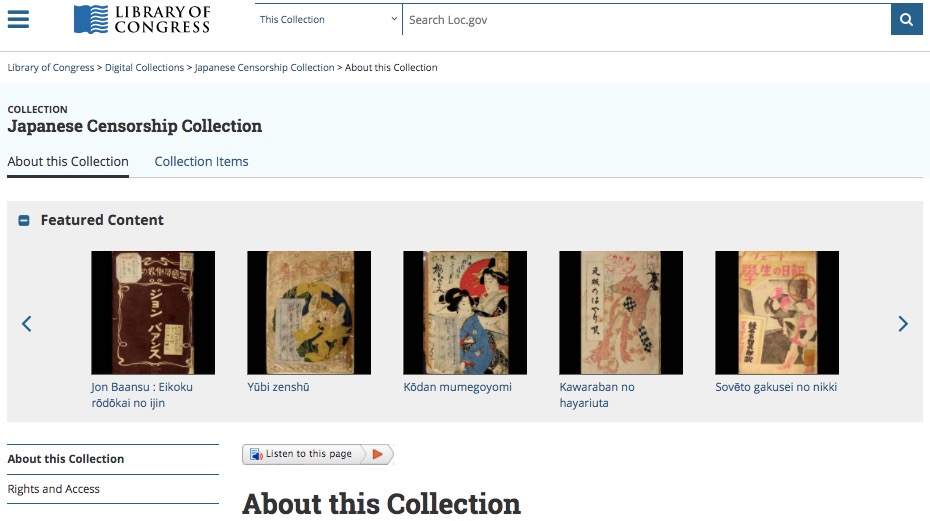Now Available Online: Library of Congress Digitizes Unique Japanese Censorship Collection
The Library of Congress’ Asian Division has digitized its Japanese Censorship Collection, a unique online archive comprising more than 1,000 marked-up copies of government-censored monographs and galley proofs from the 1920s and 1930s in Japan. The collection, originally from the Home Ministry’s library, reveals traces of the otherwise-hidden censorship process of the Japanese government through marginal notes, stamps, penciled lines and commentary inscribed by the censors’ own hands.
“Each of these books are uniquely different from all other existing copies and editions of similar titles in Japan and elsewhere, making this collection a rich archive here at the Library of Congress for the historical study of censorship,” said Librarian of Congress Carla Hayden.
In prewar Japan, the Home Ministry was among the most powerful government entities. Not only was it tasked with censoring publications, it held jurisdiction over police, infrastructure, elections, public health and religious affairs. Following Japan’s defeat, the ministry’s censorship library was seized by the allied forces and sent to the Washington Document Center in the United States.
It was later transferred to the Library of Congress, along with massive volumes of books and other materials requisitioned from other official institutions, including the Ministry of Foreign Affairs, the Japanese Imperial Army and the South Manchurian Railway Company.
The collection has been digitally preserved and made available to the public online.
The Library digitized the Japanese Censorship Collection in collaboration with Japan’s National Diet Library.
“Prior to World War II, censorship prevailed in Japan with the official aim of protecting peace and order in society from subversive ideologies and guarding traditional customs from obscenity. Toward these ends, censors suppressed, deleted or revised publications that they deemed a threat to social and political stability,” said Eiichi Ito, a Japanese reference specialist in the Asian Division.
The majority of the collection dates to the period between 1923, when the Home Ministry’s building in Tokyo burned down in the Great Kanto earthquake, and 1945, when the imperial Japanese government’s surrender marked the end of World War II.
Common targets included works that espoused socialist ideologies or contained sexual themes, but many ultranationalist groups, especially those promoting anti-government activities, drew the attention of the censors’ red pen as well. Such decisions are often readily indicated by the censors’ handwritten comments and Home Ministry seals stamped directly on copies of the books.
All 1,327 items in the collection can be viewed when accessed on-site at the Library of Congress. At present, 247 of the censored titles are available on the Library’s website for off-site viewing, but this number will continue to grow as more titles enter the public domain.
The Asian Division, founded in 1928, currently has custody of more than 4 million items in over 100 different Asian languages found in seven collections: Chinese, Japanese, Korean, Mongolian, South Asian, Southeast Asian and Tibetan collections. The Asian Reading Room, located in the Library’s Thomas Jefferson Building, room 150, is the public gateway to access the Asian collections.
The Japanese collection, initiated with an exchange of government publications in 1875, has grown to more than 1.2 million volumes of books and serials as well as extensive microform holdings. The humanities and social sciences are strongly represented and are complemented by a significant collection of scientific and technical journals and Japanese government publications from both national and local levels.
Direct to Japanese Censorship Collection (via Library of Congress)
About Gary Price
Gary Price (gprice@gmail.com) is a librarian, writer, consultant, and frequent conference speaker based in the Washington D.C. metro area. He earned his MLIS degree from Wayne State University in Detroit. Price has won several awards including the SLA Innovations in Technology Award and Alumnus of the Year from the Wayne St. University Library and Information Science Program. From 2006-2009 he was Director of Online Information Services at Ask.com.



